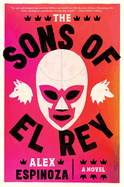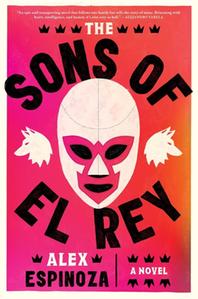
 The tender and revelatory family drama The Sons of El Rey by Alex Espinoza (The Five Acts of Diego León) follows three generations of Mexican-American men as their passion for lucha libre sustains them through immigration, loss, and secret heartache.
The tender and revelatory family drama The Sons of El Rey by Alex Espinoza (The Five Acts of Diego León) follows three generations of Mexican-American men as their passion for lucha libre sustains them through immigration, loss, and secret heartache.
In the 1960s, Ernesto Vega leaves his life as a pig farmer in a Mexican village to move to Mexico City, joined by his strong-willed wife, Elena, who refuses to stay behind and wait for him. There he becomes the successful luchador El Rey Coyote, immersed in a world of battle and pageantry that embraces a performative version of queerness in a society shrouded by homophobia. His forbidden love for his best friend overshadows his fame and marriage, although he cannot make the relationship public without destroying his reputation.
Decades later in 2020, Ernesto is now an old man dying in the hospital and his son Freddy struggles with the pandemic-mandated closure of the family gym Ernesto founded 40 years ago after emigrating to Los Angeles. Freddy can "feel him in every corner and cold pocket," helpless against the closure just as he is helpless against his father's impending death. Freddy's son Julian is frustrated by his father's macho reluctance to accept his help or emotional support. Julian's financial struggles following grad school lead him into high-end sex work, in which he finds himself playing out a client's reductive fantasies about Mexican-American men. Layers of unspoken loss and longing divide the Vega family as the alternating narratives of father, son, and grandson come to light across decades of both metaphorical and literal fighting to build a future.
Most great family dramas have a mystery at their cores, a secret thorn buried in the family's foundation and shrouded in protective silence, and The Sons of El Rey is no exception. Espinoza draws readers into the ripple effects of toxic masculinity, racism, and unspoken truths as the Vega men fight in succession to reconcile their inner lives with societal expectations of their identities with varying degrees of success. Espinoza's prose hits with raw emotional power, illuminating the ways in which "[t]he hurt is what shapes us." This saga of fathers and sons, literal and metaphorical masks, and the American dream spans several turbulent decades and highlights the need for each generation to keep moving forward and keep fighting. --Jaclyn Fulwood, blogger at Infinite Reads
Shelf Talker:Three generations of Mexican American men grapple with masculinity, identity, and their family's legacy in the lucha libre world.

